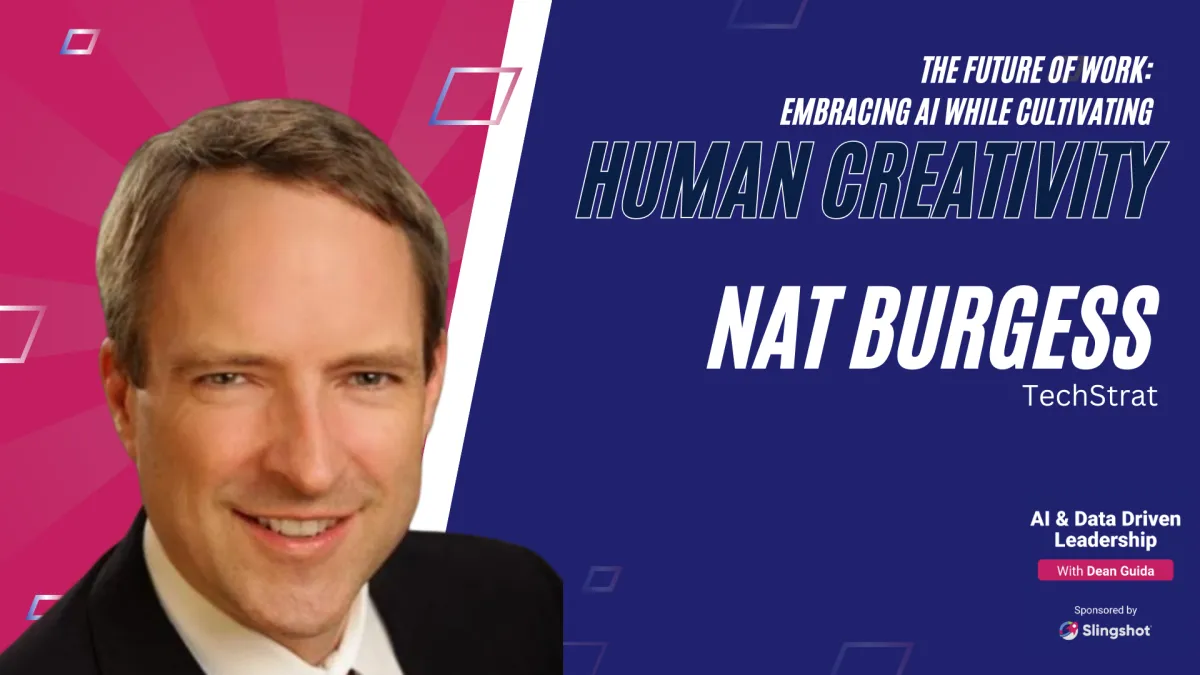Blog

7 - The Future of Work: Embracing AI While Cultivating Human Creativity
Navigating the AI Landscape: Insights from Nat Burgess, CEO of TechStrat
In this episode of the AI & Data Driven Leadership Podcast, host Dean Guida sits down with Nat Burgess, CEO and Managing Partner of TechStrat, to dive into the evolving world of artificial intelligence (AI) and its significant impact on business strategy. With his extensive background in technology and finance, Nat provides valuable insights into AI’s potential, the critical role of data quality, and how businesses can leverage AI effectively to enhance their operations while managing realistic expectations.
AI as a Commodity: Understanding the Realities
Nat begins by addressing the growing hype around AI, emphasizing its transformative potential while acknowledging that it is quickly becoming a commodity. The once-costly task of building large language models (LLMs) is now more accessible for businesses that know how to strategically implement AI technologies. However, Nat warns that the effectiveness of AI largely depends on the quality of the data being fed into it. Businesses should focus on gathering accurate and relevant data to ensure the success of AI applications, avoiding the temptation of investing in AI simply for the sake of keeping up with trends. While AI has the potential to streamline business processes and enhance operations, Nat stresses that companies must be cautious when setting expectations for what AI can achieve. AI is not a one-size-fits-all solution, and businesses need to focus on clear, achievable goals rather than the overhyped capabilities often promised by AI providers. By managing expectations internally and with customers, businesses can better integrate AI into their operations without facing the disappointment of unmet promises.
Data’s Crucial Role in Business Decisions
Nat places a strong emphasis on transparency when it comes to data-driven decision-making. He stresses the importance of presenting data in a way that allows for full examination of the methodology behind it. By ensuring transparency in data processes, businesses can build trust with stakeholders and make better-informed decisions. Nat reflects on his own experiences, particularly in his involvement with school board decisions, where transparency in data was critical to avoid manipulation and biases in decision-making.
When it comes to evaluating AI, Nat advocates for a holistic approach that looks beyond traditional metrics and test scores. AI models may pass benchmarks in areas like math or coding, but these tests do not always reflect AI’s true capabilities in real-world scenarios. Nat encourages businesses to assess AI based on its practical applications, such as problem-solving abilities and overall performance, rather than relying solely on theoretical benchmarks.
Key Takeaways from the Episode
AI as a Commodity: AI is becoming more accessible and affordable, but businesses must approach it strategically.
Data Quality: High-quality data is essential for the effectiveness of AI and the success of business operations.
Managing AI Expectations: Set realistic goals for AI implementation and manage customer expectations accordingly.
Investment Diversification: Consider balancing investments in tech with more stable industries to mitigate risks in uncertain markets.
Holistic AI Evaluation: Businesses should evaluate AI based on real-world applications and feedback rather than just theoretical metrics.
This episode provides crucial insights from Nat Burgess on how businesses can effectively navigate the AI landscape. His focus on managing AI expectations, understanding data quality, and diversifying investments offers valuable guidance for leaders aiming to integrate AI into their organizations strategically.
Want to Learn More?
Explore Slingshotapp.io: Discover how Slingshotapp.io helps businesses leverage data and AI to drive growth and optimize operations.
Apply to be a Podcast Guest: If you're an expert in AI, technology, or business strategy, apply to be a guest on our podcast here.
Listen and Subscribe to the AI & Data Driven Leadership Podcast Now:
Say "Hey, Siri / Alexa. Play AI & Data Driven Leadership Podcast"
About The Host
Tech entrepreneur and CEO Dean Guida knows there’s a limit to what you can build with grit alone.
At sixteen, Dean bought the first IBM PC and fell in love with writing software. He went on to receive a Bachelor of Science degree in operation research from the University of Miami. After graduating, he was a freelance developer and wrote many systems for IBM and on Wall Street. At twenty-three, he started Infragistics to build UX/UI tools for professional software developers.
Seemingly overnight, Dean had to go from early internet coder to business operator—a feat that forced him to learn some of business’s biggest lessons on the job. He immediately began navigating the nuances of scaling a company, hiring and growing teams, and becoming a leader, a manager, and a mentor.
Fast-forward thirty-five years, and Dean’s tech company now has operations in six countries. More than two million developers use Infragistics software, and its client roster boasts 100 percent of the S&P 500, including Fidelity, Morgan Stanley, Exxon, Intuit, and Bank of America.

Media














